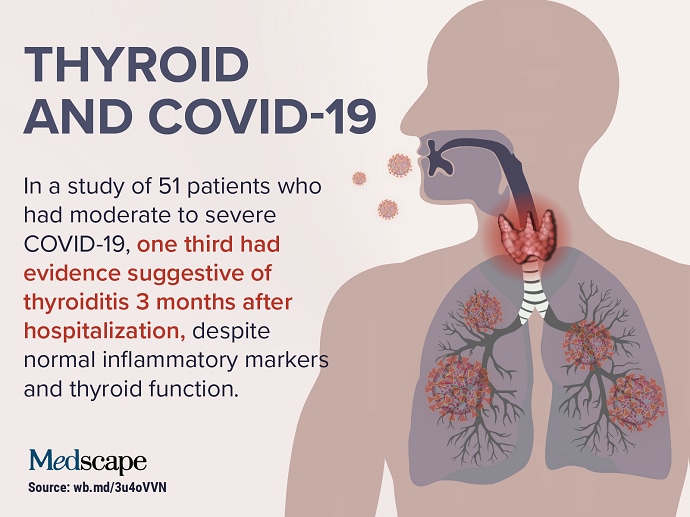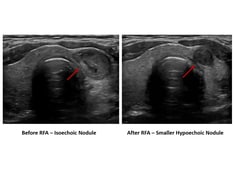Each week, we identify one top search term, speculate about what caused its popularity, and provide an infographic on a related condition. If you have thoughts about what's trending and why, share them with us on Twitter or Facebook. Find the latest COVID-19 news and guidance in Medscape's Coronavirus Resource Center.
New research presented at the virtual ENDO 2021 meeting found that individuals with thyroid gland inflammation during acute COVID-19 illness may still have subacute thyroiditis months later (see Infographic below). The study of 51 formerly hospitalized patients found that two thirds had reduced uptake on thyroid scintigraphy; however, few had antithyroid autoantibodies. Experts say that COVID-19 appears to cause damage to the thyroid gland. The gland expresses high levels of angiotensin-converting enzyme 2 (ACE2) and transmembrane protease serine 2, which allow SARS-CoV-2 to infect human cells. In her presentation, Ilaria Muller, MD, PhD, emphasized, "It is important to continue to follow these patients since they might develop thyroid dysfunction during the following months." Some have suggested that thyroid testing should occur in this patient group every 6 months for a year.
Whether COVID-19 worsens existing thyroid disease is a separate concern. A recent study concluded that patients treated for hypothyroidism or hyperthyroidism are not at increased risk of acquiring SARS-CoV-2 and that treatment does not influence COVID-19 progression. However, patients with uncontrolled thyroid issues (especially hyperthyroidism) may be at higher risk for complications of overt thyrotoxicosis and thyroid storm. Experts recommend that patients continue their antithyroid medications to decrease this risk.
In treatment news, a study found that approximately a third of older patients treated with thyroid hormones report the concurrent use of medications that can interfere with thyroid function testing. This could potentially compromise treatment decisions. The findings were presented as a poster during virtual ENDO 2021. In evaluating data on 538,137 patients treated with thyroid hormones from the Corporate Data Warehouse of the Veterans Health Administration, researchers found that 170,261 (31.6%) patients were taking at least one drug that could potentially interfere with thyroid function testing.
Another presentation at ENDO 2021 reported that combination hormone treatment for hypothyroidism is as effective as levothyroxine alone. The double-blind randomized study showed no differences in thyroid symptoms or secondary outcomes among those treated with levothyroxine alone, levothyroxine in combination with triiodothyronine, or desiccated thyroid extract. "There are now proven good treatment options for the more than 1 in 10 patients with hypothyroidism who continue to experience symptoms of fatigue, mental fogginess, weight gain, and other symptoms despite taking levothyroxine," first author Thanh Duc Hoang, DO, an endocrinologist at the Walter Reed National Military Medical Center, in Bethesda, Maryland, said in a press statement.
Elsewhere, a population-based study concluded that the incidence of thyroid cases has increased markedly since the late 1990s. Research showed that the increase has been largely confined to the papillary subtype. The investigators say that this is probably due to overscreening, as sensitive imaging studies are leading to overdiagnosis. The potential for overdiagnosis was recently estimated to be about 20% for certain types, including thyroid cancer, leading to calls to relabel low-risk lesions as something other than cancer.
The concerns about ongoing subacute thyroiditis after acute COVID-19 illness, along with new information about thyroid testing, thyroid treatment efficacy, and increased rates of thyroid cancer, combined to result in this week's top trending clinical topic.
Medscape © 2021 WebMD, LLC
Any views expressed above are the author's own and do not necessarily reflect the views of WebMD or Medscape.
Cite this: Ryan Syrek. Trending Clinical Topic: Thyroid and COVID-19 - Medscape - Apr 02, 2021.








Comments